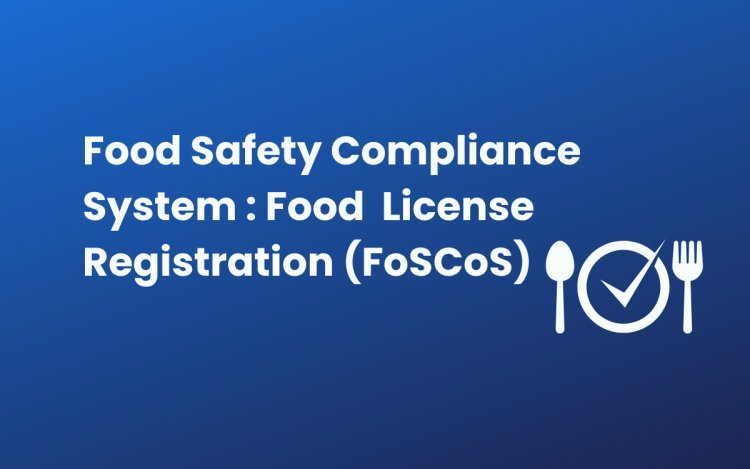Would you trust a brand that doesn't guarantee the safety of the food it serves?
In the food business, safety is more than a requirement—it’s the foundation of consumer confidence, brand reputation, and long-term success. Whether you're managing a catering unit, restaurant chain, cloud kitchen, or packaged food brand, compliance with food safety laws is not optional—it’s essential.
To help food businesses navigate this critical responsibility, the Food Safety and Standards Authority of India (FSSAI) introduced the Food Safety Compliance System (FoSCoS)—a centralized digital platform designed to simplify food license registration and compliance tracking across the country.
It’s not just good ingredients or a skilled cook that makes your favorite meal taste great—it’s strong food safety compliance that ensures it doesn’t make anyone sick.
What Food Safety Compliance Entails
Food safety compliance means strictly following laws, guidelines, and procedures that ensure food is safe to consume. In India, the FSSAI regulates these standards to prevent contamination and promote hygienic practices across food businesses.
This process involves continuous effort including regular inspections, employee training, and close monitoring of food production stages to protect consumer health and the business's reputation.
Important Practices to Ensure Food Safety
Hygiene and Sanitation
-
Maintaining clean equipment, surfaces, and food handling areas
-
Implementing pest control and sanitization protocols
-
Enforcing personal hygiene among staff
Hazard Analysis and Control
-
Identifying potential risks such as biological, chemical, or physical hazards
-
Monitoring critical points in production to prevent contamination
Traceability and Documentation
-
Keeping detailed records of ingredient sources, processing, and distribution
-
Enabling fast response and product recalls if necessary
Employee Training and Awareness
-
Providing regular training on food safety, allergen handling, and hygiene
-
Ensuring staff understand and comply with FSSAI regulations
Regulatory Compliance
-
Following Indian food safety laws and international standards like ISO 22000
-
Conducting internal and external audits to maintain compliance
Following the “Four Cs” principle—Clean, Cook, Chill, and avoid Cross-contamination—is fundamental in all food handling processes.
How FoSCoS Supports Food Businesses
FoSCoS offers a streamlined digital platform designed to support food businesses throughout the licensing and compliance journey:
-
Online Registration and Licensing:
Simplifies application submission, document uploads, and payment processes. -
Centralized Information Management:
Maintains all license details, product categories, and compliance history in one place. -
Access to Training Resources:
Provides online modules for food safety education tailored to business needs. -
Audit and Inspection Coordination:
Facilitates scheduling and tracking of FSSAI inspections. -
Real-Time Reporting:
Generates instant reports on registrations, approvals, and compliance statuses to enhance transparency.
By using FoSCoS, businesses reduce administrative burden, accelerate approvals, and maintain up-to-date compliance records.
Steps to Obtain FSSAI Registration via FoSCoS
-
Register on the Portal:
Visit https://foscos.fssai.gov.in/ and create an account or log in. -
Select License Type:
Choose Basic Registration, State License, or Central License based on your business turnover and scale. -
Complete Application:
Provide business details, upload required documents such as identity proof and address proof. -
Pay Fees Online:
Submit the applicable fee and receive a 17-digit reference number for tracking. -
Inspection (If Required):
FSSAI may conduct an inspection to verify compliance before approval. -
Receive License:
Once approved, download your FSSAI registration certificate from the portal.
The Role of Food Safety in Business Operations and HR
For business leaders and HR professionals, maintaining food safety is critical to operational excellence and workforce accountability. It:
-
Fosters a culture of hygiene and responsibility among employees
-
Ensures staff receive necessary food safety training and certification
-
Prevents legal risks and operational disruptions
-
Enhances consumer confidence in both product and company
Conclusion
Compliance with food safety regulations is essential not only to protect consumers but also to sustain and grow your business. Using a comprehensive approach—adhering to hazard control principles, maintaining hygiene standards, and leveraging digital platforms like FoSCoS—helps food businesses stay safe and credible.
Engaging a food safety consultant can further simplify compliance and support continuous improvement.
Frequently Asked Questions (FAQs)
-
What is food safety compliance?
Following all laws and guidelines to ensure food is safe and uncontaminated. -
Why is it important for businesses?
To prevent illnesses, maintain brand reputation, and avoid legal issues. -
What are the “Four Cs” of food safety?
Clean, Cook, Chill, and avoid Cross-contamination. -
What is FSSAI’s role?
It is the Indian authority that sets and enforces food safety standards. -
Is food safety a one-time task?
No, it requires continuous monitoring, training, and improvements. -
What hazards does hazard analysis cover?
Biological (bacteria, viruses), chemical (pesticides, allergens), and physical (glass, metal) hazards.






